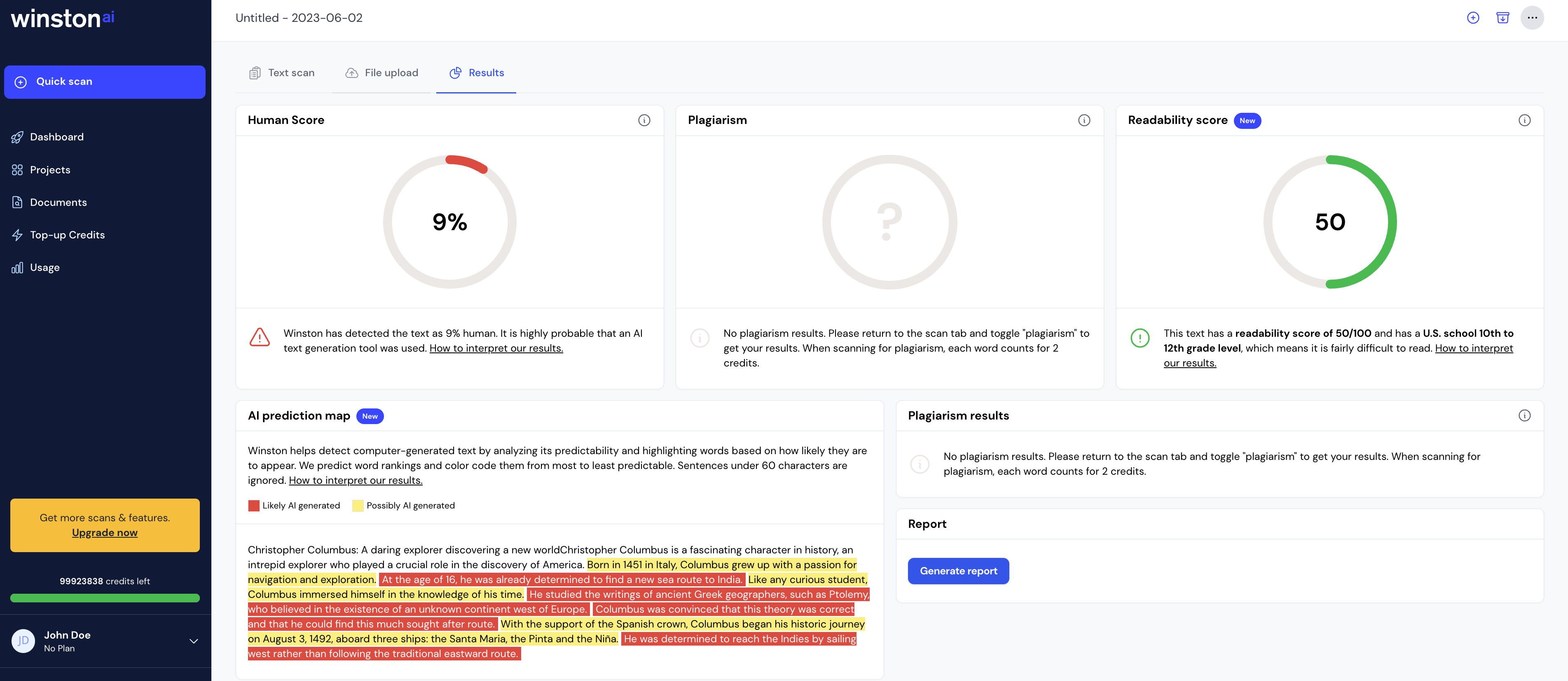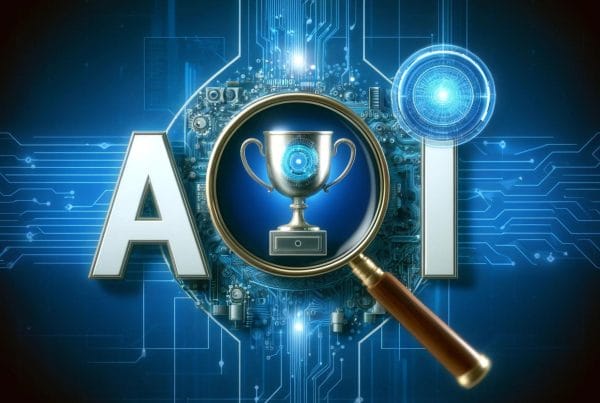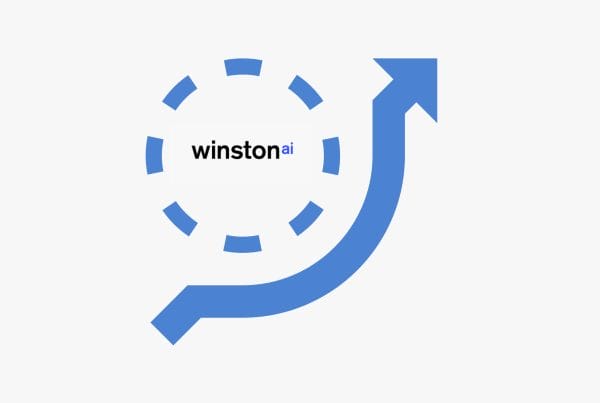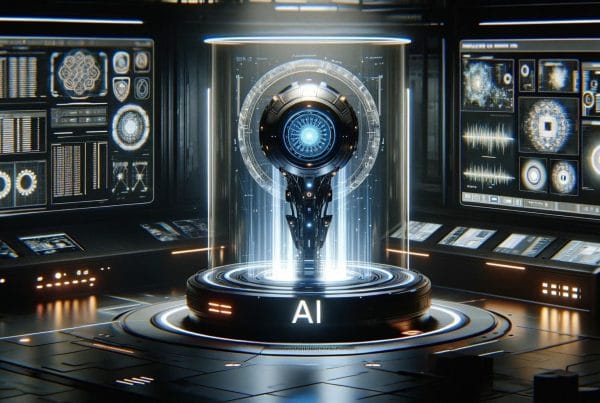Introduction
There’s no doubt that generative AI has been moving too fast recently, catching a lot of professionals off guard. Teachers and publishers who only recently simply had to worry about plagiarism now have a much bigger issue: ChatGPT.
Free and easy to use, ChatGPT can produce incredibly good content on any topic instantly. The issue is this content isn’t really “plagiarized” per say, it is original in the sense that it is unique. However, there are issues with integrity that AI detection tools are here to solve.
From Plagiarism to AI detection
Plagiarism is a practice where someone will copy another person’s work without giving them proper credit. Several software were launched in the early 2000’s to helped teachers and publishers determine if the work they were handed was taken from someone else.
They introduced advanced algorithms that could find similarities between texts and flag plagiarized content.
With the rise of AI writing tools such as ChatGPT, there is no need to borrow or copy someone else’s work. Students and publishers can simply ask these tools to do their entire work, creating a set of new integrity issues. This is why AI content detection tools are now essential, and used by millions of people. AI detection tools will scan and analyze a given text and return an assessment on the odds it was AI generated or human made.
Getting the AI detection assessment right
If you’d like to understand how AI detection tools work, we recommend going through our article on the subject. In this article, we’ll try and explain what makes an AI detector better than another.
Data Training: one of the key elements for the best LLM’s is how much data they are trained on, and how well they are trained to understand the data in question. The same rule applies to AI detection tools, where a huge amount of data is fed to a given model that will eventually become the heart of the software.
Testing and reviewing our data: Once we have a model ready, we will go through intensive testing to push the limit of our model, and see how well it can detect AI generated content. During our latest testing, Winston AI scored 99.6% in detecting AI generated content.
Providing a clear assessment: Powerful AI detectors like Winston AI should provide 2 main assessments to help you determine if your content is AI generated. First, an overall score that will scan your entire text in our advanced model. This assessment is the most accurate one by far since it uses more data to return a score. Secondly, our AI prediction map will go sentence by sentence to highlight sentences that are extremely similar to what a generative AI tool would have written in the context.
Staying ahead of new LLM releases and re-training our models
ChatGPT brought a lot of attention to artificial intelligence, and since that launch, it seems like every week brings years of progress. There are now several extremely powerful LLM’s including Anthropic’s Claude, Stable Diffusion’s Stable LM, Llama, Bing Chat and Google Bard.
Furthermore, existing models will get significant updates.
Every single new release should be extensively tested on AI detectors, as their generation methods and styles will differ. A good AI content detector will definitely add bulk of text and data from new models to update its detection capabilities and train its model to recognize the updates and new models.
Winston AI’s team is constantly staying ahead of update and new developments in Artificial Intelligence, and our detection capabilities are only improving with time!
Conclusion
In conclusion, the rise of generative AI tools like ChatGPT has brought forth new challenges in maintaining content integrity, leading to the need for effective AI detection tools.
While traditional plagiarism detection software focused on identifying copied content, AI detection tools now play a crucial role in assessing the likelihood of AI-generated text versus human-made content. The effectiveness of an AI detector depends on factors such as extensive data training, rigorous testing, and providing clear assessments. Winston AI, for example, has demonstrated impressive results, scoring 99.6% in detecting AI-generated content. As the landscape of generative AI continues to evolve with new models and updates, it is essential for AI detectors to stay ahead, constantly retraining their models to recognize and adapt to these advancements. Winston AI’s commitment to staying abreast of the latest developments ensures their detection capabilities continually improve over time, making it one of the best AI detectors available.
FAQ
AI detection tools are important because AI writing tools like ChatGPT can produce content that is original but not created by the author. This creates integrity issues in terms of content ownership and plagiarism. AI detection tools help assess the likelihood of AI-generated content versus human-made content, ensuring content integrity is maintained.
The effectiveness of an AI detector depends on several factors. One key factor is extensive data training, where the detector is trained on a large amount of data to understand and identify AI-generated content accurately. Rigorous testing is also crucial to push the limits of the detector and assess its ability to detect AI-generated content. Additionally, providing clear assessments, such as overall scores and AI prediction maps, helps users determine if their content is AI-generated or not.
Winston AI demonstrates its capabilities by scoring 99.6% in detecting AI-generated content during intensive testing. It emphasizes extensive data training to ensure accurate detection. Winston AI also provides clear assessments, including overall scores and AI prediction maps that highlight sentences similar to generative AI tools’ writing style. By staying ahead of new developments in the field and constantly retraining its models, Winston AI’s detection capabilities continue to improve over time.



